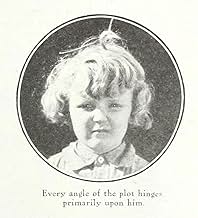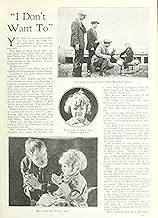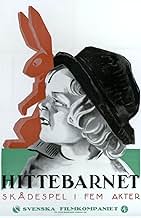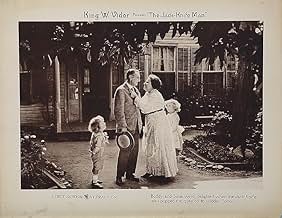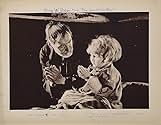A lonely old riverboat man is left a child by a dying mother. The old man and the boy grow to love each other. The village snoop feels that the boy would be better off in an orphanage, and t... Read allA lonely old riverboat man is left a child by a dying mother. The old man and the boy grow to love each other. The village snoop feels that the boy would be better off in an orphanage, and the sheriff is sent to try to take him away.A lonely old riverboat man is left a child by a dying mother. The old man and the boy grow to love each other. The village snoop feels that the boy would be better off in an orphanage, and the sheriff is sent to try to take him away.
F.A. Turner
- Peter Lane
- (as Fred Turner)
Claire McDowell
- Lize Merdin
- (as Claire MacDowell)
Irene Yeager
- Susie
- (as Irene Yaeger)
Anna Dodge
- Undetermined Role
- (as Mrs. George Hernandez)
- Director
- Writers
- All cast & crew
- Production, box office & more at IMDbPro
Featured reviews
10rsoonsa
Veteran stage performer Fred Turner portrays Peter Lane, a shantyboat resident who is unexpectedly placed in the position of caretaker for a three year-old boy, due to the death of the boy's mother, and who faces a wide range of challenges in this extraordinarily well-made and scripted 1920 silent, which benefits from the directing and writing skills of King Vidor. Strong acting is in evidence from Turner, Harry Todd as a good-hearted tramp whose role becomes very important, Florence Vidor, Lillian Leighton and James Corrigan, as the film showcases a large dose of clever writing, building to a satisfying and sentimental climax. Most of the work's activity takes place in Lane's houseboat, which possesses the healing powers of home to him, as he attempts to ward off the nuptial blandishments of an attractive widow. The film is marked by a very gentle nature, is graced with delightful moments of humour and is an excellent early example of Vidor's proletarian stylistics and his mastery of montage, all enhanced by the entirely appropriate original organ score performed by Rosa Rio.
Peter Lane lives by himself in an old houseboat. During a storm one night, a woman and her small son Buddy seek shelter with Lane. The woman dies the next day from exposure, and when the attending physician assumes the woman and Buddy are Lane's wife and son, Lane does not correct him. One day, a tramp named Booge tries to take off on the boat while Lane is looking for food. Lane stops him, then decides to take on Booge if he helps with the chores. Together, the two men take care of Buddy. Lane uses his jack-knife to carve wooden animals for Buddy, while Booge amuses the boy with songs and woodwork. Complications ensue when the town's Justice of the Peace, Briggles, tries to take Buddy away from Lane.
This is a sweet film, and highly recommended. It is unfortunate the print on YouTube is mediocre, but the film is still watchable. The acting is solid across the board. Kelso is very cute. All the main performers were in their 40s, 50s and, in the case of Lane, 60s, and yet this seems like a film to be enjoyed by all ages. King Vidor's wife Florence has a small but pivotal role near the end of the film.
There is also an amusing subplot involving the Widow Potter (well-played by Lillian Leighton) and her attempts to hook Lane. An unforeseen twist late in the film makes the final scene at fadeout very poignant and bittersweet.
This is a sweet film, and highly recommended. It is unfortunate the print on YouTube is mediocre, but the film is still watchable. The acting is solid across the board. Kelso is very cute. All the main performers were in their 40s, 50s and, in the case of Lane, 60s, and yet this seems like a film to be enjoyed by all ages. King Vidor's wife Florence has a small but pivotal role near the end of the film.
There is also an amusing subplot involving the Widow Potter (well-played by Lillian Leighton) and her attempts to hook Lane. An unforeseen twist late in the film makes the final scene at fadeout very poignant and bittersweet.
First National was so impressed by King Vidor's early work it agreed to an unusual contract for a director to fund his own studio. King's Christian Science beliefs were at core of his new venture's films. He issued a decree, published in Variety, stating a series of personal commitments to his movies, emphasizing in his last point "I will make only those founded on the principles of right, and I will endeavor to draw upon the inexhaustible source of good for my stories, my guidance and my inspiration." It was a principle Vidor strived for throughout the remainder of his movie career.
His first First National movie was August 1920 "The Jack-Knife Man." The William Parker script has a lonely old riverboat clock maker who witnesses a dying mother leaving her young child in his care. Along the lines of Charlie Chaplin's 'The Kid,' Vidor's film has authorities severing the strong bond between the two. A twist at the end dealing with the clock maker constructing wooden toys for the boy with his jack knife was praised by critics. First National, however, informed him its executives loved to see a bit more levity in his forthcoming movies, which Vidor accepted. Judging from his next movies he made at 'Vidor Village.'
His first First National movie was August 1920 "The Jack-Knife Man." The William Parker script has a lonely old riverboat clock maker who witnesses a dying mother leaving her young child in his care. Along the lines of Charlie Chaplin's 'The Kid,' Vidor's film has authorities severing the strong bond between the two. A twist at the end dealing with the clock maker constructing wooden toys for the boy with his jack knife was praised by critics. First National, however, informed him its executives loved to see a bit more levity in his forthcoming movies, which Vidor accepted. Judging from his next movies he made at 'Vidor Village.'
Details
- Runtime1 hour
- Color
- Sound mix
- Aspect ratio
- 1.33 : 1
Contribute to this page
Suggest an edit or add missing content


